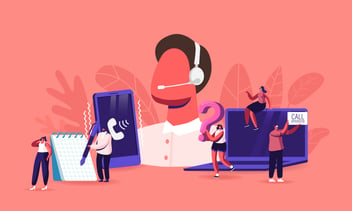A Career Change Looks Different for Everyone. Here’s How to Explore Yours.
At the height of the pandemic, employers witnessed the Great Resignation where millions of people, in want of better pay or fulfillment, quit their jobs to pursue new opportunities. Now, in 2024, quit rates have quietly subsided to 3.385 million.
However, if you recognize a need for a career transition, a slowed job market shouldn’t stop you from fulfilling your goals. You may be a mother on maternity leave eager to return to the workforce, or a woman with decades of industry experience seeking an entirely new field. Regardless of your current season, it's never too late to pursue reinvention.
Career innovation is unique for everyone.
Innovation doesn’t just apply to organizational processes or product updates—it enables you to transform your career no matter where you are in your journey. As you self-reflect and identify your needs, consider:
- Do I want a minor or major change in my career?
- What drives my need for innovation? Do I feel that my growth has become stagnant, or my role no longer aligns with my core values?
- What do I want to leave behind, and what are some immediate steps I can take?
- What gives me purpose, and how can a career transition help me tap into it?
While everyone’s path looks different, it’s important to keep a few principles in mind. Here are some of ours to guide you as you navigate your transformation.
1. Become comfortable with the unknown.
When I decided to pursue content writing after a few years as an English teacher, I immediately struggled with self-doubt. Was it wise to go down this road, especially just after acquiring a Master’s degree in teaching?
It required a leap of faith, but I still chose to quit my job and spend a few months polishing my resume and portfolio. Fast forward to the present: after about a year and a half at an agency, I became a content writer for CCWomen. Now, I have the freedom to create pieces that drive DEIA as the foundation for revolutionizing the business world. Although it took me quite some time, I’m finally at a place where I can write about my passions and uplift other women through storytelling.
While the unknown presents inevitable risk, it also opens you up to new opportunities. Reframing your mindset allows you to adapt and build resilience, so as you navigate the uncertainty, you’ll be better equipped.
2. Evolve your existing strengths.
The good news: you don’t have to start from scratch when revamping your career. No matter what, you’re bound to have accumulated skills at your present or previous role that will still be transferable to your next job.
Aside from a brief content marketing internship, I had little writing experience. So, I made sure to highlight applicable skills I learned as a teacher, such as communication, project management, and storytelling. I knew they would still serve me well.
It’s important to identify those strengths to then upskill them. According to a recent Future of Jobs report, almost half of companies had employees completing additional training to close knowledge gaps. By refining your capabilities—even if they’re soft skills you want to take into a new field—you gradually set yourself up for success.
3. Connect with people outside your usual network.
Expanding your network doesn’t have to be an extensive process. There are many ways to get started, even by relying on your current community to elevate and sponsor you. Whether your mentor, manager, or colleague, don’t hesitate to ask for help. Advocate for your needs and demonstrate your commitment to your career growth goals, and they’ll be sure to provide support.
Building new connections also exposes you to diverse perspectives that can help you make more informed decisions for a more seamless career transition. For instance, if you’re a HR professional moving into tech, you can gather valuable insights from product managers and software engineers.
Broaden your horizons, open yourself up to new partnerships, and seize any opportunity to enrich your circle.
4. Allow failures to become opportunities.
No one likes to accept failure, but it’s an inevitable, sometimes necessary process that takes you a step closer to career reinvention. Don’t let it determine your ability or worth; consider every shortcoming as a learning experience to lead you toward the right direction.
A growth mindset empowers you to recognize the potential behind every obstacle. So, every time you “fail” to achieve a goal, you can identify which strategy is ineffective and implement alternative solutions to get you where you need to be.
Every professional, no matter how accomplished, has made their share of mistakes that have still pushed them to become the best version of themselves. Take comfort in the fact that failure is a universal lesson, meant to empower you rather than prohibit you from making any progress.
5. Reimagine your personal brand.
Everyone has a brand that influences how they’re perceived. For companies that want to build customer trust, optimizing a strong brand presence remains a high priority because, above all, people actively prefer authentic connections over flattering, but surface-level communication.
Think about your current narrative and how your career reinvention can elevate it. Was there a specific aha moment that drove you to your decision? Or, did you have a more gradual build-up throughout your role that led you to a more drastic change?
Empower your career transition with our CCWomen+ community.
Whether you choose to upskill or pivot, a career change of any sort can be daunting. But when you need access to resources or professional insights, a supportive network makes all the difference. CCWomen is the premier membership platform to meet those needs.
Discover your community with us. Sign up for our membership today!




